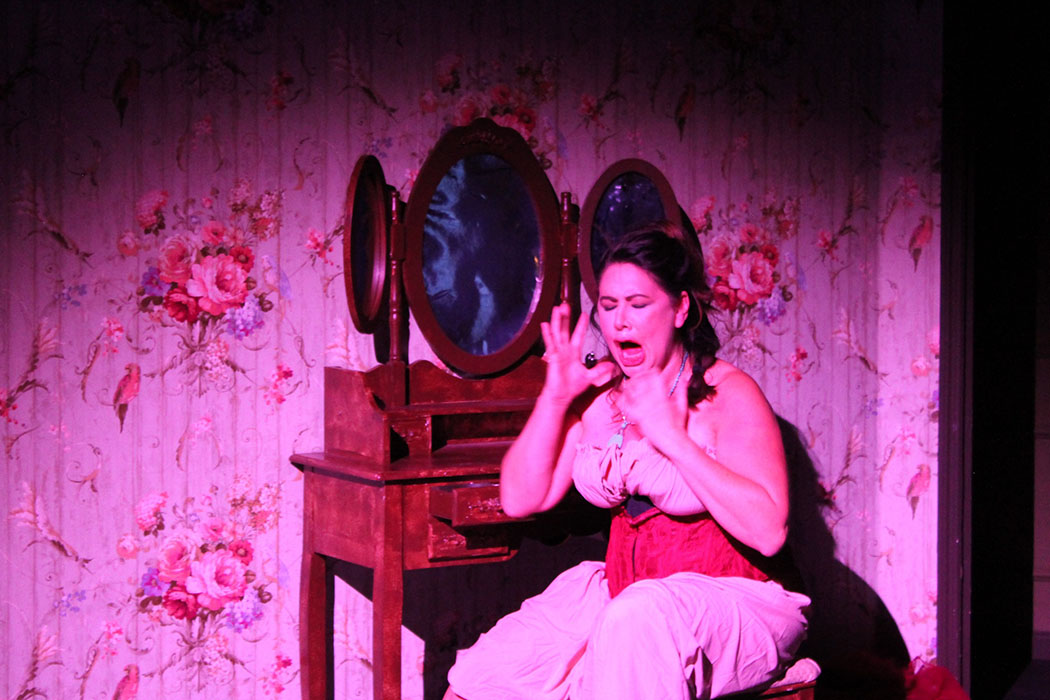Exploring different stylistic niches in opera has been the raison d’etre of Marble City Opera since its beginning in 2013. Its productions over that time have ranged from works with timely relevance (I Can’t Breathe) to classics in alternative locations (Tosca at St. John’s Cathedral and La Traviata at Westwood)—from world premieres of original works (Shadowlight) to contemporary classics from 20th Century composers (Menotti’s Amahl and the Night Visitors and The Telephone). For its 2022 season-closer, MCO has yet again entered new performance territory and struck operatic gold with the stage premiere of The Copper Queen, music by Clint Borzoni and libretto by John de los Santos.
The Copper Queen was commissioned by Arizona Opera, but its live premiere there was halted by the Covid-19 pandemic precautions. Instead of live performances, the company opted to shoot the opera as a film which was offered as theatrical and on-demand screenings last fall. Having expressed interest in the work early on, MCO became first in line for the actual stage premiere of the work.
For this production of The Copper Queen staged at Flying Anvil Theatre, librettist de los Santos has also served as director, bringing first-hand insights and his original intentions to the staging. The partially inherited set has been fine-tuned and turned into Room 315 of the Copper Queen Hotel in Bisbee, Arizona, where only minor details separate the 1910 Old West mining town era and its captive “working girl” Julia Lowell, from its 2010 parallel track and hotel visitor Addison Moore. Setting up this parallel track, writer Moore (mezzo-soprano Sara Crigger) is visiting Bisbee and has checked into Room 315 to get away from the sadness of her grandmother’s recent death and to investigate the rumors of the room’s haunting by the ghost of Julia Lowell, who came to a tragic end there.
The opera’s dramatic arc shifts back and forth between the two time periods, setting up a juxtaposition between Moore and the life of “soiled dove” Lowell (soprano Kathryn Frady). Gradually we learn that Lowell is mostly a captive of Daddy Lowell’s (Graham Anduri) money-making operation with her services as the centerpiece. In operatic tragic fashion, Lowell endures both pleasure and pain, the latter coming from clients, abusive client Peter Ackerman (baritone Daniel Spiotta) as well as from her demanding, abusive father. On the pleasurable side, Lowell falls in love with one of her regular clients, the unhappy Teddy (tenor David Silvano), who promises to help her escape her captive environment. Of course, tragedy demands that their plan falls through when Teddy reveals his wife is pregnant and he cannot leave her. With aching sadness, she gives him a necklace as a gift for the child and prepares her own escape—an escape that is thwarted when her father arrives and murders her. The opera’s reveal takes the story full-circle and offers a resolution to what has been a delicious secret for 100 years.
Even for opera lovers, the words “contemporary opera” are not always a welcome phrase. Happily for all, though, Borzoni’s score wanted no part of bristling-thorn intervals or sour-milk dissonant harmonies. The work is simultaneously melodic and complex, tuneful and rich, attractive and dramatically lush—dispelling the notion that contemporary opera has to be a stranger in a strange land.

Vocally and dramatically, this was a strong and noteworthy cast. Julia is a plum role for Kathryn Frady, who has both the lyrical softness to soothe and the dramatic power capable of knocking one’s socks off. Sara Crigger gave her Addison Moore a charming, lovely clarity that was a necessary counterpart to Julia. Graham Anduri sang two roles, both Daddy Lowell and hotel desk man Mr. Floyd, making the similarities and differences in the characters into a neat dramatic hook.

Tenor David Silvano brought a deliciously romantic lyrical side to Teddy, while baritone Daniel Spiotta took the bad guy role of Ackerman to an equally impressive, but dark and foreboding place. Bass-baritone Jacob Lay, as Sugar Dog, a client of Julia’s, opened ears with an incredibly smooth delivery. The 17-member orchestra, squeezed into one of the theatre’s entrance alleys, was led by music director Christy Lee.
In the past, although Marble City Opera has begrudgingly endured the inability to properly light its productions in the unusual alternative venues it selects, that wasn’t the case this time around. De los Santos and his lighting designer, Joshua Mullady, have created a minimal, but dramatically successful environment in the Flying Anvil Theatre space—white light clarity for the 2010 scenes and richly muted and dappled reds and golds for the period scenes. Such a vehicle as this terrific production of The Copper Queen and its moody tragedy really needs that kind of attention.






